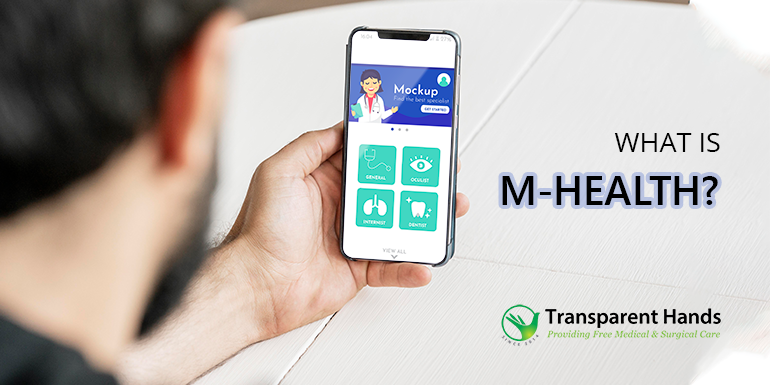Mobile Health: What is mHealth?

Mobile health, abbreviated as mHealth- is NOT about the mobile’s battery life & health or the rays coming out of the mobile devices, or anything like the duration and exposure to the mobile phones. So, what is it? Well, mobile health aims to utilize communication technology devices for efficient healthcare delivery to the users. There is an increasing number of apps innovating the healthcare system. This article will describe the purpose of healthcare apps and how they improve healthcare. Furthermore, we will discuss the potentials of mobile health and its current challenges.
Merits & demerits – What do the experts say?
Institute of Healthcare Improvement describes the Triple Aim- improving population health, enhancing the quality and level of satisfaction, and lowering the healthcare expenses. The healthcare system around the world is working to achieve the Triple Aim. For this purpose, mHealth is a breakthrough in medicine. The Institute of Medicine proposed health information technology (HIT) as a potential source of attaining the Triple Aim. However, out of several mHealth apps available on different platforms, very few are helpful. Contrarily, some maybe even harmful. The main reason being the misguidance and misinformation associated with the apps. Here we quote the Chief Executive Officer of the American Medical Association (AMA), Dr. James Madara, who described the digital healthcare apps as “digital snake oil of the early 21st century”. Hence, the users should not entirely rely on the apps, and also, it is crucial to choose the apps carefully.
Approaches of mHealth- how can we make it work?
1-Digitalization: The initial step in mHealth is optimizing the medical records via Electronic Health Records (EHRs). In addition to EHR, Claims data, including physicians’ visits, pharmacy billings, and medication refills information, help coordinate the care delivery points such as laboratories, physicians, and pharmacies. For example, a person with diabetes visits multiple physicians for multiple conditions, i.e., to a local laboratory to measure glucose level, then to his primary physician for diabetes, an ophthalmologist for an eye checkup, and finally to a pharmacy. If his physician uses claims data, he will have a better insight into his patient’s other ailments, medication refills, drug interactions and will be able to make a better health decision for him.
Ischemic Heart Disease & Pakistan
2- Accessibility: Since mobile devices are pretty common, the technology makes it possible to reach out to rural areas. Mobile health can connect people with healthcare providers more efficiently. It can provide a suitable means of health surveillance. Moreover, an online booking system for appointments at the clinics can reduce the long queues. For instance, WeChat in China made healthcare more efficient by engaging and monitoring patients, enhancing communication between people and health professionals, and reducing healthcare costs.
3-Self-monitoring: More sophisticated approaches include using predictive apps for diagnosis, healthcare notifications and alerts, and tracking the vitals using wearable sensors like a smartwatch or bracelet. The most widely used healthcare apps can record routine exercise, heartbeat, diet planner, distance run tracker, etc. They can also indicate the average screen time of the mobile user. The features allow the users to adhere to medication, increase self-management, and avoid risk factors.
Mobile health- a success story
During the Covid19 pandemic, internet hospitals compensated for the inaccessibility to health services to some extent. It also helped provide psychological counseling during the quarantine and lockdown. Furthermore, the Chinese government and health bodies collaborated with social media apps to update viral transmission, diagnosis, and policies.
Shifting to mobile health – challenges
Currently, shifting to mobile health is a complex task. The medical sensors manufacturers or the app developers may provide the patient-generated data to the health professionals, but who would decide that the data is valid? Or does it contain the necessary information for the clinician to make a health-related decision for the patient? The health staff is traditionally not trained to utilize the patient-generated data. They also have a strict routine and limited time. Hence, they prefer the conventional healthcare system. Additionally, the use of patients’ data and privacy concerns raise some ethical issues.
Limitations and Future implications – how can mHealth reshape the future of medicine
Mobile health can lead us towards personalized healthcare. The concept of precision medicine/personalized medicine enables adjusting the healthcare approach and medical interventions according to the individual patient’s needs. Currently, it is challenging to shift to mobile health. The development and deployment of healthcare through mobile health are still in progress. If done correctly, mobile health can overcome the barriers that affect the coverage of healthcare. Widespread mobile and internet use suggests that the mobile health approach can fill the gap between healthcare facilities in urban versus rural regions. However, the precision of healthcare apps is yet to be improved. The accuracy of the apps depends on the data size. Therefore, the apps will not predict the health condition unless the algorithm is trained on a comprehensive dataset. The availability of data is one of the limitations. Moreover, healthcare management should closely supervise the usage and reliability of the apps utilized in healthcare.
Read More: Best Organizations To Give Zakat In Asia










Leave Your Comments